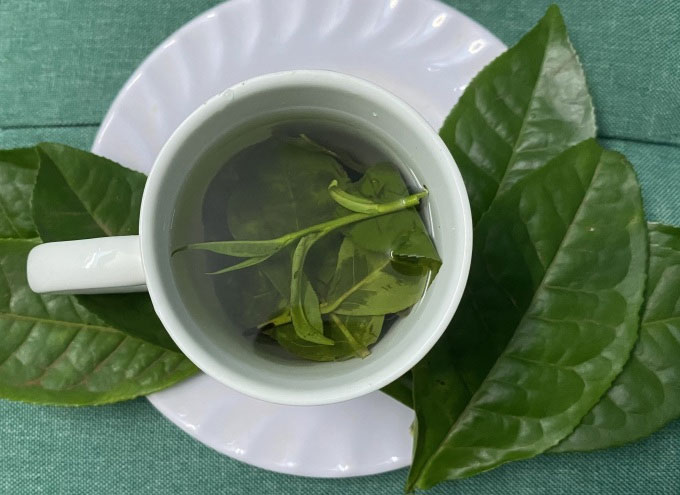Drinking green tea reduces symptoms of rheumatoid arthritis
Green tea is rich in antioxidants that have anti-inflammatory effects and reduce symptoms in people with rheumatoid arthritis .
Green tea is a widely consumed beverage around the world. In addition to caffeine, green tea also contains the amino acid L-theanine, fluoride, and antioxidants that provide many health benefits. Some studies show that green tea consumption is good for people with rheumatoid arthritis.
A 2017 study by Washington State University of Pharmacy, USA, showed that epigallocatechin 3-gallate (EGCG) and epicatechin 3-gallate (ECG) in green tea have the effect of hindering the inflammatory process, which causes pain and damage. in rheumatoid arthritis.
Rheumatoid arthritis is characterized by synovitis and tissue destruction in the joints. Activated synovial fibroblasts cause the synovial membrane to thicken due to increased proliferation. Infiltrating monocytes and macrophages produce inflammatory cytokines that activate synovial fibroblasts to produce inflammatory mediators such as IL-6 and IL-8 .
High levels of IL-6 cause systemic and synovial inflammation, resulting in synovial fibroblasts releasing enzymes that degrade adjacent cartilage and bone, leading to total joint destruction.
EGCG and ECG inhibit the production of inflammatory mediators IL-6 and IL-8 related to rheumatoid arthritis. Therefore, drinking green tea can help reduce symptoms and improve this condition.

Green tea is rich in antioxidants that help reduce inflammation. (Photo: Mai Cat).
A 2016 study by the Catholic University of Korea, also showed that EGCG in green tea reduces arthritis symptoms, inhibits bone formation and increases the number of T cells (human immune cells). Consuming EGCG also reduces the arthritis index and has a protective effect against joint destruction in collagen-induced arthritis.
According to a 2011 review by the University of Alabama, USA, based on 10 studies, the mixture of main polyphenolic components in green tea including epicatechin, epigallocatechin, epicatechin gallate and epigallocatechin-3 gallate (EGCG) is effective in preventing diseases. Inflammation-related diseases, including arthritis. EGCG has the ability to protect human cartilage cells from inflammatory reactions, and has potential in the treatment and prevention of arthritis.
EGCG reduces inflammatory cytokines, which is beneficial for people with arthritis. Chronic inflammation is also a cause of regeneration and destruction of connective tissue in arthritis. Therefore, reducing inflammation by drinking green tea can prevent the development and improve the disease.
According to a 2008 study by Rutgers University, USA, the symptoms of rats with rheumatoid arthritis who drank water with green tea extract were less severe than those of rats with this disease who drank regular water. Researchers suggest that green tea extract may be beneficial when used alongside conventional treatments for rheumatoid arthritis in humans.
Polyphenolic compounds isolated from green tea are rich in antioxidants such as epicatechin (EC), epigallocatechin (EGC), epicatechin 3-gallate (ECG) and EGCG which have anti-inflammatory properties. They have the ability to protect against arthritis.
- Many people with rheumatoid arthritis do not know
- Causes and risk factors of rheumatoid arthritis (Part 1)
- Causes and risk factors for rheumatoid arthritis (Part 2)
- Eating fish reduces the risk of rheumatoid arthritis
- Rheumatoid arthritis makes it difficult for women to become pregnant
- Distinguish between Gout and Rheumatoid Arthritis
- High cholesterol, a warning sign of rheumatoid arthritis
- No association between rheumatic inflammation and air pollution?
- Rheumatoid arthritis because of eating a lot of meat
- Everything you know about Vitamin D has never been wrong
- Three new drugs that treat rheumatoid arthritis effectively
- 5 types of dangerous diseases can be detected by eye examination
 13 causes of non-itchy rash
13 causes of non-itchy rash How the mouse with human ears changed the world?
How the mouse with human ears changed the world? The truth about 'fried rice syndrome!
The truth about 'fried rice syndrome! What is dental implant?
What is dental implant?